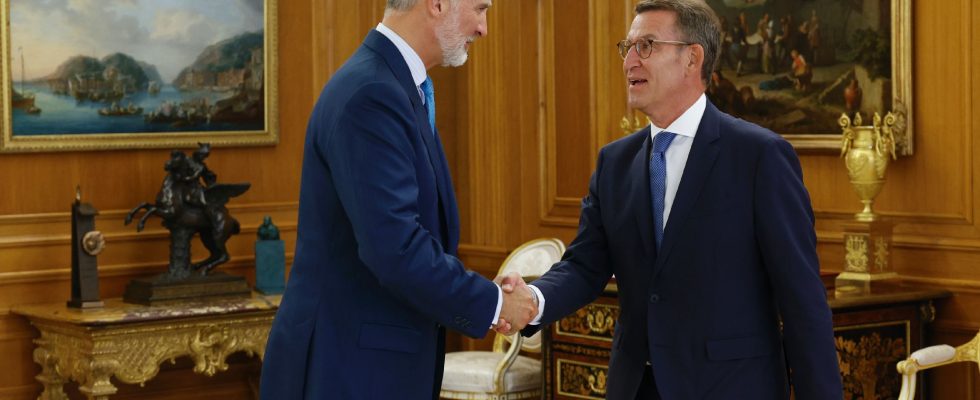It is an almost impossible mission that Alberto Núñez Feijóo will tackle given that he is far from having the required majority… The leader of the right has just been appointed by the King of Spain Felipe VI, this Tuesday August 22, to try to be invested Prime Minister by the deputies, announced the president of the Assembly.
The king communicated “his decision to propose Mr. Alberto Núñez Feijóo”, leader of the People’s Party (PP, right), “as a candidate for the presidency of the government”, declared during a press conference the socialist Francina Armengol, new President of the Congress of Deputies renewed in the elections of July 23.
A custom of the current Spanish constitution
The King’s decision was Cornelian and so far very uncertain because neither Alberto Núñez Feijóo nor the outgoing Socialist Prime Minister, Pedro Sanchez, can claim the required majority due to the results of the July 23 early elections.
“The People’s Party was the political group that obtained the largest number of seats” in parliament, justified the Royal Palace in a press release, recalling that this “practice” has become a “custom” under the current constitution Spanish.
Francina Armengol said she would contact Alberto Núñez Feijóo in the next few hours to set a date for the nomination debate. “I thank His Majesty the King for his decision […] We will give a voice to the more than 11 million citizens who want change”, welcomed Alberto Núñez Feijóo on the social network X (formerly Twitter).
After their respective talks with the king on Tuesday, they both reiterated that they were ready to submit to a vote of investiture if the sovereign’s choice fell on them
A two month countdown
In the first round, an absolute majority of 176 votes (out of a total of 350 deputies) is required, while a simple majority is sufficient in the second round. If the nomination vote fails, a two-month countdown will be triggered to try to find another majority, failing which, legislative elections will be called again.
Alberto Núñez Feijóo claims the right to submit to a nomination vote because the PP won the most seats. But he can only have a maximum of 172 votes: those of the 137 deputies of the PP, plus the 33 of Vox and the deputies of two small regional parties.
Based on this observation, Pedro Sánchez believes that the leader of the right has no chance and has long considered that appointing him to appear before the deputies was a waste of time. However, he said on Tuesday, after his audience with the king, that he would have no objection if Felipe VI nominated Alberto Núñez Feijóo.
Pedro Sánchez can only count on 164 votes
“Whatever decision the head of state takes, it will have the support of the Spanish Socialist Workers’ Party,” he told a press conference ahead of the announcement of the king’s decision, while repeating that a vote of investiture of the leader of the PP would be “a failure”. “There is no other alternative than a government of progress”, he said, that is to say a renewal of the outgoing coalition between the socialists and the radical left.
He acknowledged that Alberto Núñez Feijóo had an assured total of 172 votes, but, he said, “it seems obvious that we have a higher ceiling”. He was referring to the fact that Francina Armengol was elected last Thursday as President of the Congress in the first round with 178 votes thanks to the votes of the deputies of the two Catalan independence parties, ERC and especially Junts per Catalunya (JxCat).
But at present, this majority does not exist and Pedro Sánchez can only count on 164 votes. ERC and especially Junts have, indeed, underlined last week that a vote of nomination would require new negotiations for which they have set the bar very high.
Their two main demands are for a referendum on self-determination and amnesty for all those charged after Catalonia’s failed 2017 secession attempt that forced Carles Puigdemont to flee to Belgium to escape Spanish justice.
Alberto Núñez Feijóo claimed to be “only four votes from an absolute majority”, while Pedro Sánchez, he said, “is a distance from an amnesty” and “from an independence referendum”.
